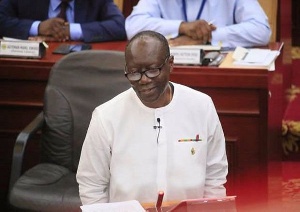 Ken Ofori-Atta, Minister of Finance
Ken Ofori-Atta, Minister of Finance
Parents whose children have been enrolled under the Free Senior High School (SHS) programme risk being exempted from the Policy starting September 2019 if they fail to register for a Tax Identification Number (TIN).
Additionally, they would not be able to register for the National Health Insurance Scheme, acquire a passport, register their vehicles and land, open bank account and access other public services.
Mr Anthony Selom Dzadzra, a Director at the Revenue Policy Division, Ministry of Finance in an interview with the Ghana News Agency on the side-lines of a Post-Budget Sensitisation workshop for journalists in Accra on Monday said the Directive was outlined in the 2019 Budget Statement and Economic Policy of Government.
In that regard, he said, every citizen that wanted to transact business with any government institution and access other social interventions must acquire a TIN to facilitate that process.
Mr Dzadzra said the enforcement of the Directive would enable the Government to generate sufficient revenue to propel its infrastructural development agenda.
“For us to go Ghana beyond Aid, we have to generate revenue in this country and everybody needs to pay a little tax. Therefore, one of the ways of realising this is to make sure everybody is known through the TIN,’’ he said.
“This will enable the Revenue Authorities to easily identify taxpayers and those who have not been captured under the tax net.”
Mr Dzadzra noted that the long-term vision of government is to reduce import taxes so that manufacturing companies can import machinery to increase production.
This, according to him, would enable manufacturing firms to expand their businesses and employ more people.
He said government could then take direct and indirect taxes from the firms in addition to the income taxes from workers to shore up its revenue.
He said it was prudent for companies that gave commercial loans to government to pay consumption taxes, which would serve as a means to streamline the tax exemption regime.
Mr Ken Ofori-Atta, the Minister of Finance, presenting the 2019 Budget Statement to Parliament on November 15, outlined six priority areas of Government.
They are Agriculture, Industry, Infrastructural Development, Entrepreneurial Support, Revenue Mobilization, Protecting the Public Purse and Social Partnership.
Government has projected to spend GH¢73.4 billion in the 2019 Budget and mobilise GH¢58.7 billion in revenues through taxes and levies.